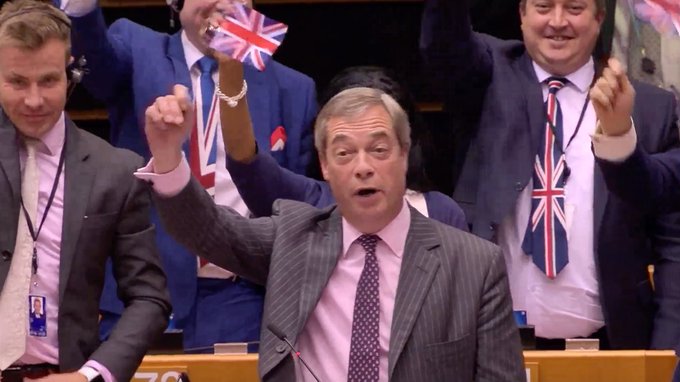Today is Brexit Day. As of 6:00 P.M. EST (Midnight in Brussels), the United Kingdom no longer will be a member of the European Union.
This is definitely good news in the long run since the U.K. will now be somewhat insulated from inevitable economic crises  caused by the European’s Union’s dirigiste economic model and grim demographic outlook.
caused by the European’s Union’s dirigiste economic model and grim demographic outlook.
 caused by the European’s Union’s dirigiste economic model and grim demographic outlook.
caused by the European’s Union’s dirigiste economic model and grim demographic outlook.
Whether it’s also good news in the short run depends mostly on decisions in London, such as whether Prime Minister Boris Johnson and his Tory government expand economic freedom (which should be the case, but there are worrisome signs that the spending burden will increase).
But Washington and Brussels also will play a role since the U.K. wants to sign free-trade agreements. This could be a problem since the E.U. will be tempted to behave in a spiteful manner and Trump and his trade team are protectionists.
But let’s set that aside for the moment and look at the big picture.
The Wall Street Journal nicely summarized the key takeaways in yesterday’s editorial about Brexit.
The EU was founded on the notion that only an ever-deeper economic union—with an ever-closer political union close on its heels—could secure peace and prosperity… Most continental political leaders, if not their voters, still believe this. …British voters think otherwise. Their 2016 vote to leave the EU, ratified in December’s general election, was not a vote for war and poverty. …voters had the temerity to assert themselves despite resistance from a political and bureaucratic class invested in the status quo.…One feature of this new politics is how immune voters have become to economic scaremongering… Britons instead have heard European anxiety that Brexit will trigger a “race to the bottom” on economic policy. What this really means is that EU politicians are aware that a freer economy more open to commerce at home and trade outside the EU would deliver more prosperity to more people than continental social democracy. British voters may not embrace this open vision in the end, but they’ve given themselves the choice. …All of this frightens so-called good Europeans…because it’s a direct challenge to…their “European project.” Central to this worldview is a distrust of…markets… A Britain with greater political independence and deep trading ties to Europe without all the useless red tape and hopeless centralizing could be a model. …Britain’s voters in 2016, and again in 2019, chose peaceful and prosperous coexistence with their neighbors rather than mindless but relentless integration. It’s the most consequential choice any European electorate has made in at least a generation.
Amen.
Brexit is very good news (December’s election in the U.K., which ensured Brexit, was the best policy-related development of 2019).
I t means more jurisdictional competition, which is good news for those of us who want some sort of restraint on government greed.
t means more jurisdictional competition, which is good news for those of us who want some sort of restraint on government greed.
 t means more jurisdictional competition, which is good news for those of us who want some sort of restraint on government greed.
t means more jurisdictional competition, which is good news for those of us who want some sort of restraint on government greed.
And it means less power for the E.U. bureaucracy, which has a nasty habit of trying to export bad tax policy and bad regulatory policy.
Brexit also is a victory for Nigel Farage. Here are his final remarks to the European Parliament.
Farage has been called the “most consequential political figure in a generation in Europe, perhaps the whole of the West.”
This actually may be true. Brexit almost surely happened because of Farage’s efforts.
And to achieve that goal in the face of unified establishment opposition is truly remarkable.
Speaking of establishment opposition, let’s close today with an updated version of a PG-13 song about how the British people responded to the practitioners of “Project Fear.”


No comments:
Post a Comment